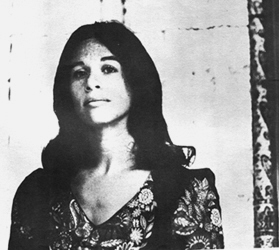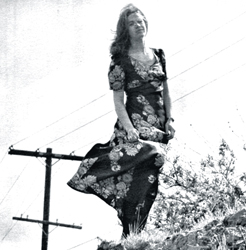Both the beauty and the drawback of “Carole King Writer,” Carole’s first real effort at a solo record, is that it’s basically a series of well-made demos. “Tapestry” worked because it felt like one viewpoint and voice, it touched you like a letter from home when you were “So Far Away.” “Tapestry” was polished without being overproduced, but “Writer” manages to be both over-and-under-produced at the same time.
Some of the mixes are uneven, drowning out vocals at times and there’s an overall “tinny” feeling to the production – the musicians are playing well, but not clicking as a band. And surely we do miss the steady hand of a pro like Lou Adler at the producer’s helm.
There are too many different styles, from rock to soul to twangy country to bluesy numbers to glorious, sunshiney pop perfection. But it’s too diverse to make a feeling of cohesion, of thematic consistency, of a connection between the songs, something to link the audience with the performer. However flawed, “Writer” ultimately serves as a showcase for a songwriter at the top of her form. This was the logical culmination of years of creating some of the most highly coveted, black market-circulated, demo records in the history of pop music.
“Spaceship Races,” a sort of rocking ballad, does not give the record the best start and although Carole’s voice is strong, I’m not sure what Gerry Goffin’s s lyrics are trying to convey here. It’s only a fair tune, though there are some nice highs and lows.
Next up is “No Easy Way Down,” in my opinion of one of Goffin and King’s greatest songs. Carole gives it all the power and passion it deserves, much superior to Barbra Streisand’s sanitized version. Carole is gritty and tough and the bluesy background singers are perfectly reminiscent of Carole’s long past “girl group” days. I love the powerful bridge, “You know it isn’t very easy!” the ladies singing like a church choir in the background, the piano, bass and drums booming and Carole’s powerful, emotive voice convincingly conveys the power of Gerry’s brilliant lyric.

|
|
Child of Mine” is a wonderfully timeless lullaby, with Carole showcasing her emotional range as well as a gloriously tearjerking melody. And then there is the nice thought of Carole and Gerry both creating this ode to their two daughters, bridging the transition from husband and wife, to be proud, but now separate parents.
"Goin’ Back” with it’s country folk arrangement and wistful melody, features James Taylor himself adding beautiful guitar strokes and his wonderful harmonies. You can start to feel the transition here to the “Tapestry” era, although here, as with much of the record, the production gives the song kind of a “tinny” sound and lacks warmth.But there’s a feeling of change from her soul-influenced records of most of the 60s to that of the Southern California, “Ladies of the Canyon” sound, of which “Tapestry would become the apex. (This is not counting her spacey, Beatles-influenced “Monkees” period which produced some great songs, but most of those don’t date very well).
Things quickly devolve with the next track, “To Love.” Carole has always seemed to have some attraction to country music, but this is one of the weaker tracks here with Carole doing an unnecessary, almost comical Southern accent. The lyrics are by Toni Stern, with whom Carole would go on to write some of her biggest and best tunes. “To Love” was not, however, the most auspicious beginning.
“What Have You Got to Lose?” turns it around with another, much more evocative lyric by Stern, a beautiful melody and a wonderful, slightly jazzy arrangement that just bubbles with percussive energy. Suddenly, her collaboration with Toni Stern is giving Carole something she had never really had as a songwriter up to this point---another woman’s point of view. There is a sophistication to this song and it includes one of my favorite lyrics. As the singer coaxes her hesitant lover to take another chance, despite the pain of the past, she declares, “It’s time to step back out in the sunshine,” and the lyric is matched by a gorgeous pop melody that’s as bright as that sunshine. There is a subtle, definable difference in the work of King-Stern and this underrated song was a portent of things to come.
"Eventually” is one of Carole’s more striking melodies, a slowly paced ballad paired with Gerry’s socially-conscious lyrics, which seem just as relevant today as they did back in the tumultuous late ‘60s when they were originally written “We see people feelin’ that their lives have little worth,” Carole sings wth passion as the crescendo builds. Problem is that the mix is so bad the organ almost drowns out her voice.
|
|

"Raspberry Jam” is a the perfect break from the slow, almost hymn-like “Eventually,” a delightful “jazz waltz” with silly but charming lyrics by Toni Stern and a galloping, percussive jam (pun intended). You’ve got a great band here, piano, drums, bass, percussion, organ, it just rocks, but the mix is so poor it drowns out some of the best parts, including again drowning out her voice at points.
“Can’t You Be Real” is a slow burning, bluesy Goffin-King throwaway, something they could have written in their sleep, which also suffers from a poor mix.
“I Can’t Hear You No More” is an uptempo gem, showcasing Carole’s strong voice in another rock-soul setting. This and “Sweet Sweetheart” are decent enough pop songs from the Goffin-King catalog, pleasant but not earth-shaking.
Tying it all up, and a fitting close to this fine, but uneven collection of songs written by one of the world’s most prolific songwriters, is the classic “Up on the Roof.” Carole sings it slowly, deliberately, her voice yearning and comforting, wrapping her clarion tones around this most famous tune and fully making it her own. Gone is the gritty street feeling of the original, replaced by the warm, almost maternal quality of Carole’s voice.
All in all, “Writer” is a fine showcase for Carole as a versatile songwriter, as well as emerging performer. However, the lack of a binding theme and the weakness of production deceptively masked (at the time) the possibilities for the future and Carole’s success with “Tapestry.” “Writer” was a confident first step, in some ways faltering, in some ways soaring, but it really gave no clue of the greatness yet to come.

|